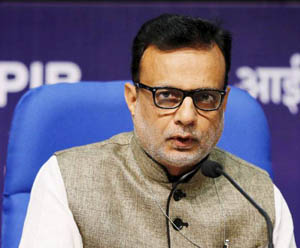New Delhi, Dec 30: Seeking to eliminate corruption and promote ease of doing business, the revenue department has asked field offices only to raise specific queries in income tax assessment cases picked up for scrutiny.
Issuing comprehensive norms for scrutiny, the Central Board of Direct Taxes (CBDT) said questionnaires on specific issues should be sent to assessees so that there is no waste of man-hour and unnecessary visits to tax department are avoided.
"We are trying to evolve a system where the interface between the assessee and tax officials is minimum. This will also help in eliminating corruption and reducing harassment of of honest tax payers," Revenue Secretary Hasmukh Adhia told PTI.
Under the new dispensation, he said, the focus of the department would be on e-scrutiny and the assessees will not have to queue up before tax offices without knowing what is required from them.
As per the instructions, tax officials should expeditiously complete in a certain number of hearings the case which has been taken up for limited scrutiny.
These initiatives form part of the drive to make the system more transparent and tax payer friendly, Adhia said adding, "I was taken aback to know that tax officials would summon assesses without raising any specific query".
Issuing the instruction, CBDT said that while issuing the first notice, the Assessment Officers (AOs) do not convey to assessees the specific compliance requirement like production of accounts and furnishing of documents.
As per CBDT instructions, tax officials should complete the scrutiny expeditiously wherein the amount involved is less than Rs 5 lakh.
"In cases selected for scrutiny, it should be the endeavour of the AO that the initial notice issued under Section 143(2) of I-T Act accompany a notice...along with the questionnaire containing details of specific document/ information/evidence that are required to be furnished by the taxpayer in connection with scrutiny assessment proceeding in their respective cases," CBDT said.
Nangia & Co Managing Partner Rakesh Nangia said: "This shall deter AOs from asking roving and general questions, causing unnecessary fear in minds of innocent taxpayers."
The CBDT instruction said further that since taxpayers are required to comply with the statutory notice issued by the AO, they remain "clueless" about the information required to be submitted.
Besides, it added, that their "appearance before the AO does not serve any fruitful purpose except recording of their presence. This causes undue hardships to taxpayers and unnecessary wastage of their time".
"Since CASS (Computer Assisted Scrutiny Selection) cycles are proposed to be run well in advance now, sufficient time shall be available with the AO to go through the returns of income which have been selected for scrutiny and identify the issues which require examination," it said.
With the objective of providing better taxpayer services, improving ease of doing business and reducing the burden of compliance on the taxpayer, CBDT has taken a number of decisions in the recent past.
"With a non-adversarial approach on minds of our policymakers, it is time to bid adieu to unnecessary troubles and harassment of taxpayers," Nangia added.
CBDT further said: "The questionnaire in the case of limited scrutiny cases shall remain confined only to the specific reasons/issues for which case has been picked up for scrutiny. Further the scope of enquiry shall be restricted to the limited scrutiny issues."
However, it added, if it comes to the notice of the AO that the potential escapement of income exceeds Rs 5 lakh or Rs 10 lakh in metro cities, the cases could be taken up for 'complete scrutiny', but only with the approval of Principal CIT or the concerned CIT.
In a separate circular, CBDT said that electronic filing of appeals is being made mandatory for those who are required to file their income tax returns electronically.
"The existing Form 35 for filing of first appeal is being substituted by a new Form. The new format for filing of appeals is more structured, objective, systematic, and aligned with the current provisions of the Income-Tax Act," a CBDT statement said.
Electronic filing of appeal will remove human interface, reduce paperwork and decrease the transaction cost for the taxpayer, it said, adding that it would ensure consistent and error free service as validations will be inbuilt resulting in fewer deficient appeals.
Online filing will also facilitate fixation of hearing of appeals electronically.
"With these changes, the burden of compliance on the taxpayers in appellate proceedings will be significantly reduced," CBDT added.






Comments
Add new comment